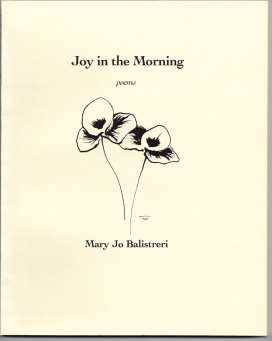Book Review
Joy in the Morning by Mary Jo Balistreri. Shoreline, WA: Bellowing Ark Press, PO Box 55564,98155, 2008. $14.00.
Reviewed by Barbara Crooker
This small collection of poetry from Mary Jo Balistreri, the size and shape of an extended chapbook, is rooted in grief (the death of two of her grandsons from a rare genetic disease), but lifts its head to the sun, rather like the line drawing of a wildflower on the cover, proclaiming that its theme is joy, not mourning.
Balistreri uses a quote from Psalm 30 to introduce the prologue: “Weeping may remain at night but rejoicing comes in the morning,” and there is an inclusive religious spirit throughout, embracing traditions as disparate as Zen Buddhism and Judaism. You can see this in some of her titles: “Meditation,” “Early Morning Blessing,” “Canticle to the Setting Sun.” In organizing the book, Balistreri uses quotations to introduce the section headings. Part I’s theme, how everything is connected, uses this quote: “The least movement is of importance to all nature. The entire ocean is affected by a pebble.” (Blaise Pascal) Part II contains ekphrastic poetry dealing not only with painting, but also with music. (“Sing, dance, paint, reflect back the star of your essence.” David Cieri) Part III is made up of poems about family: “The family, link to our past, bridge to our future.” (Alex Haley) These are quiet, meditative poems told in a gentle lyrical voice, filled with luminous images and sparkling language.
One of the strengths of this book is the immediacy of the opening lines: “Embered over the eastern seaboard, / the sun takes the entire horizon as its hearth” (“Sunrise Over the Sea”); “This is the hour I love— / the day unfolding into itself.” (“Genesis”); “Late April, and Spring opens her easel” (“Spring Comes to Saylesville Pond”). In contrast, some of the closing lines are a bit too “telling” for this reader: “Most of all, I love this solitude, the inclusion / of myself in everything that matters.” (“Awakening”) “How even today, their music is the hearth that warms me.” (“Remembering Wonder”) “I thought I must write a poem / so I never forget.” (“Moments of Light”)
That’s not to say that there isn’t much to like here. The language shines with delicacy and gentle humor. Here’s an example: “The sea puts on a wrap of palest / green while the sky lounges / in soft blue charmeuse” (“Genesis”). Here is another: turtledoves, “like small Buddhas,” ignoring “the black-masked / cardinal pecking furtively / for hidden seed.” “If they hear the wind-blown chimes, / they give no nod. They sit zazen. / Perhaps they have reached / enlightenment.” (“Meditation”). Then there are the white egrets who “speak prayer / flag dreams, hundreds of flying hopes / to greet the dawn.” (“The Egrets of Pelican Bay”) Another nod to eastern religion comes in “For Sam”: “In Normandy, among thousands of white crosses, / . . .the sea’s cool sutra / lapping against . . .rock.”
Balistreri is not afraid to be witty; in “The Visit,” the month of May “jots down items / in her blue-lined notebook,” then “pulls ten / yellow finches out of her bag. / Charmed, they puff into golden / globes.” If you know that the collective noun for goldfinches is “a charm of goldfinches,” then you can really appreciate the wordplay going on here. Her most vivid and memorable use of language comes in “Awakening”: “I love the way light spills from / the sky.” “The sky itself, shapeless, abstract / big Frankenthaler brush strokes that one could get lost / in.” The blue heron “standing in a shell of silence,” the dragonflies, with their “transparent wings,” “the wind-up / sanderlings that run a race with shirred tides, they way they / careen from water’s puckered stitch as sea meets sand,” are all examples of a writer who takes her time looking for les mots justes (just the right words) à la Flaubert. . . .
And Balistreri is not only comfortable painting with words, but also in using words to talk about paintings. Her ekphrastic poems are among her strongest; this collection contains poems about Romare Beardon, Edgar Degas, Georgia O’Keeffe, Georges Braque, Elizabeth Murray, as well as poems that have a conversation with pieces of music. In “Degas’ Woman,” she has his line “making summer out of pastel and canvas,” while later in the poem, that line draws gulls winging “in the sheeted sky, / their looped script, black and silver.” Georgia O’Keeffe “is the dark center / of poppy . . . / creating this scarlet portrait, / living outrageously.” (“Radiance”) Georges Braque’s “Seated Nude” is in transition, ready “to greet the new century of angles, cubes and facets, / her curved past slowly fading behind her.” When Balistreri is good, she’s terrific. If poetry is “best words, best order,” (Coleridge) then these lines exemplify that.
And these lines from “The Egrets of Pelican Bay” exemplify for me what works so well in this book, a light touch with rhythm, an artist’s eye for language, a musician’s ear for song: “Soon these tree temples will empty / the birds unfolding gossamer wings / into a moving steeple of praise.”
Barbara Crooker’s books are Radiance, which won the 2005 Word Press First Book Award and was a finalist for the 2006 Paterson Poetry Prize; Line Dance (Word Press, 2008), which won the 2009 Paterson Award for Literary Excellence; and More (C&R Press, 2010). She enjoyed her time working in Wisconsin when she taught at AllWriters in Waukesha, but mostly, she works from her home in rural northeastern Pennsylvania. Three of Crooker's poems appear in the current online issue.


